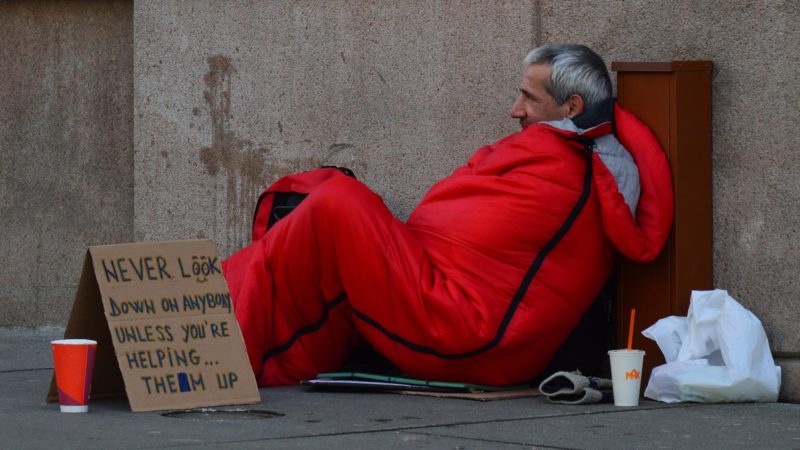
Over the last decade, the number of rough sleepers in London has more than doubled. Between 2013 and 2017, nearly 650 homeless Londoners died on our streets. There are more than 54,000 households in London living in temporary accommodation, including 87,000 children – in bed and breakfasts, hostels, poor quality private rented flats, with whole families often having to share rooms.
The causes of this truly awful situation are of course complex and myriad, but there is a common denominator behind these shocking statistics. The government’s uncompromising pursuit of austerity is plunging more and more Londoners into precarious living situations, and sadly the most vulnerable onto the streets. By 2017, the end of a private tenancy was the reason for 39% of homelessness cases, marking the single biggest cause.
The National Audit Office’s report into homelessness from the same year makes it clear that this is linked to affordability and welfare measures. Private rents increased by almost a quarter between 2010 to 2017, while median earnings increased by a mere 3%. On top of this, the Local Housing Allowance was reduced and capped from 2011. Housing benefit paid to those in need has not kept up with rising rents, and the effects have been worst in London.
In some parts of central London, there is a chasm of around £370 per week between the current capped housing allowance and the cost of eligible housing. These austerity policies have made private rented housing increasingly unaffordable for thousands of Londoners, pushed them into arrears and, sadly in many cases, homelessness. Side-tracked by its own internecine disputes, the government has shamefully lacked the political will to comprehensively tackle the causes of homelessness head on. The measures announced have been piecemeal at best.
This week, the government finally confirmed that it will consult on ending Section 21, ‘no fault’ evictions. This long overdue intervention should provide some greater security of tenure to private renters in the capital, and is a testament to the hard-fought ‘End Section 21’ campaigns of the housing charity, Shelter and Generation Rent. This measure does have the potential to help drive down homelessness. However, the fact remains that if it is not backed by caps on rent rises, the more unscrupulous landlords will be able to exploit the loophole of forcing tenants out by exorbitantly hiking up rents.
If we are to end homelessness, a tentative or fragmentary approach simply will not cut it. The fact that this inert government is finally pushing through more protections for renters is very welcome, but this is completely undermined by their failure to row back on, or even reconsider, their pernicious austerity measures and welfare reforms. As with most complex social issues, the only way forward is with a co-ordinated, multi-faceted strategy. In this sense, the government could learn from the mayor of London’s approach.
This week, the mayor announced £11m worth of funding to provide up to 200 high-quality modular homes to help homeless families stuck in the limbo of temporary accommodation and forced into unsuitable and cramped conditions. This comes on top of the £1bn that he has injected into delivering a new generation of council housing across London – the first time City Hall has ever directly funded new council homes. Last June, Sadiq Khan published City Hall’s first ever Rough Sleeping Plan of Action. The plan outlines what can be done with the mayor’s powers and resources to end rough sleeping in the capital. This supplements the £8.5m per year that the mayor invests in outreach teams and No Second Night Out Hubs.
However, the government can no longer pass the buck onto the mayor to provide the magic bullet for homelessness. The mayor’s Rough Sleeping Plan of Action requires £574m in government funding over five years to end rough sleeping and fund a wide and specialist package of support services. It should also be reiterated that to meet the huge demand for genuinely affordable homes in London, the government would need to quadruple the funding it currently gives to City Hall for affordable housing delivery.
The government must now confront the inexorable facts. If it continues down the path of enacting punitive austerity and welfare policies, dismantling the welfare state and failing to adequately fund the genuinely affordable housing – and particularly social housing – that Londoners so desperately need, even more people will be left at the mercy of an unforgiving private rented sector, to fall into arrears, or to languish on our streets.




More from LabourList
Antonia Romeo appointed to lead civil service as new Cabinet Secretary
‘If Labour is serious about upskilling Britain, it must mobilise local businesses’
Stella Tsantekidou column: ‘What are we to make of the Labour Together scandal?’